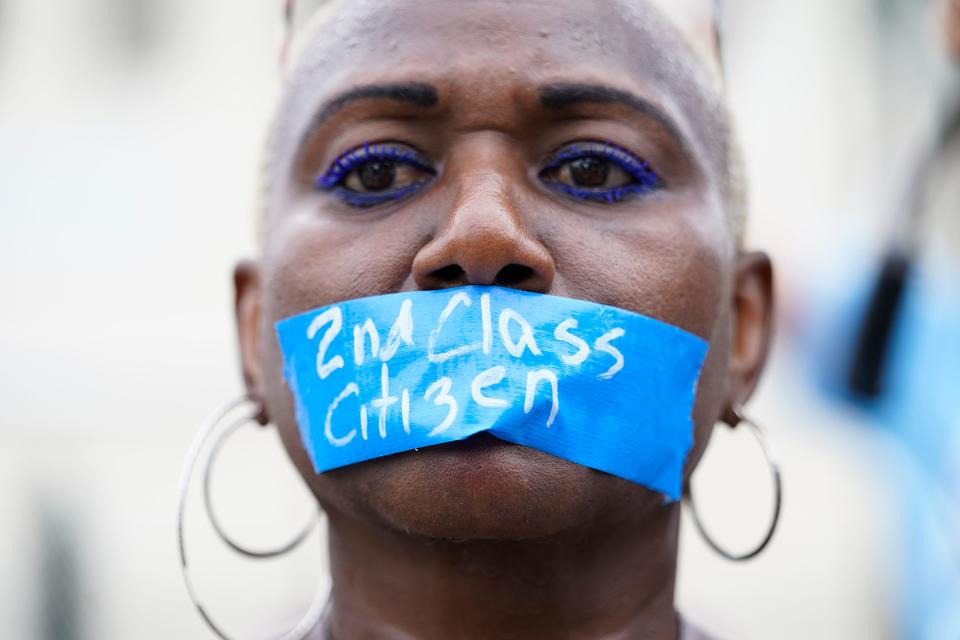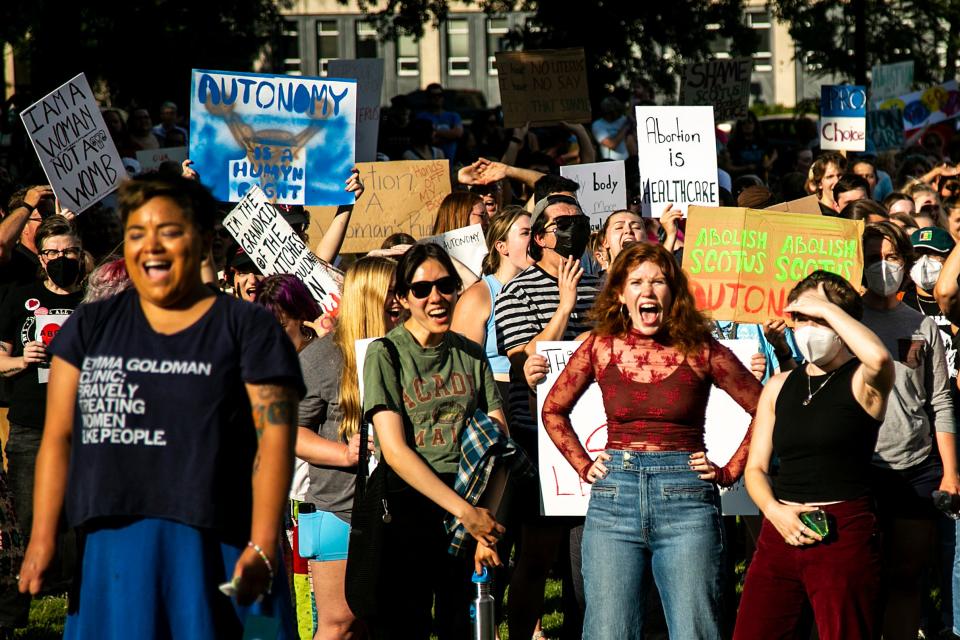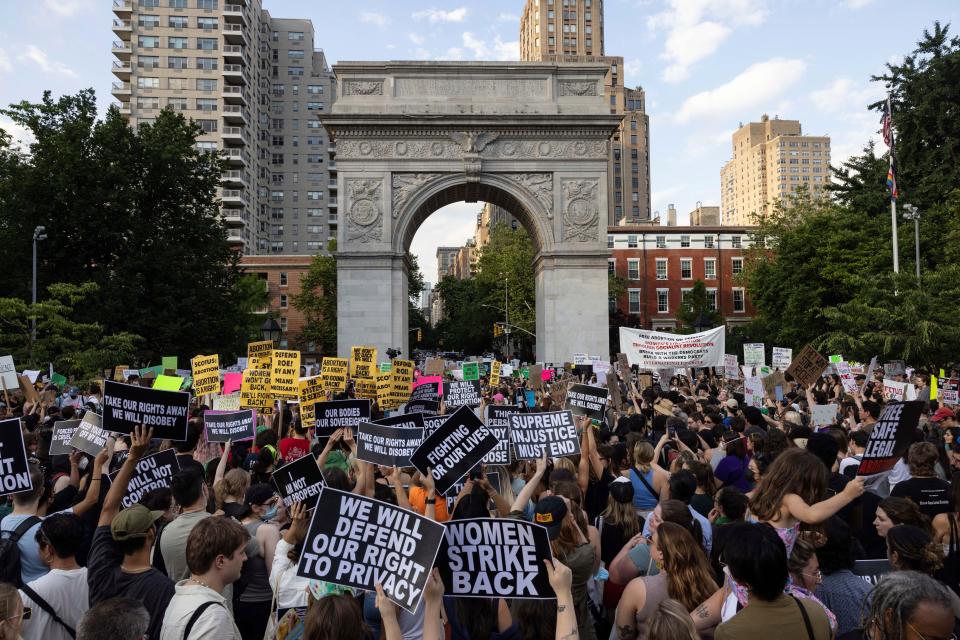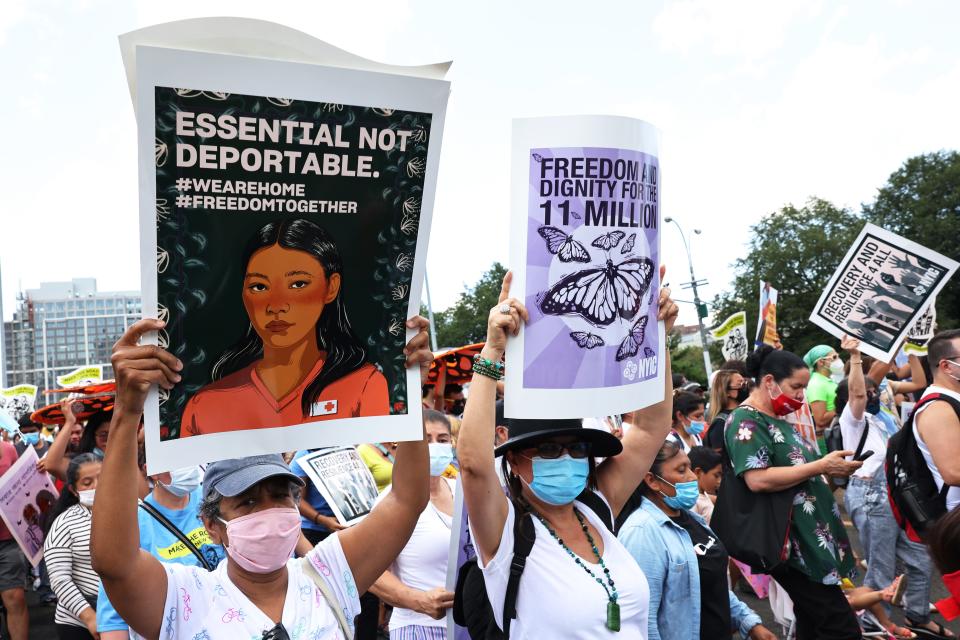'Disastrous consequences': Anti-abortion laws could make undocumented women more vulnerable
Many undocumented women already had limited access to abortion care before the Supreme Court ruling last month striking down nationwide rights to abortion. Now, with states taking steps to outlaw or limit abortion access, many women without legal immigration status are in a more vulnerable position, in part, because of the community's already tenuous relationship with law enforcement, limited access to health insurance and health care and low wages, activists said.
Twenty-six states have taken steps to ban abortion access or severely limit it or are expected to pass anti-abortion legislation, according to the Guttmacher Institute, which tracks abortion data. Some of these states are home to large populations of undocumented people, including Florida, Texas, Georgia and Arizona, according to Pew Research Center data.
"When we think about the impact of the decision, poor women, women of color and immigrant women will be the more severely affected," said Laurie Zephyrin, vice president of advancing health equity at The Commonwealth Fund, a nonpartisan research fund on health care.
Nancy Cárdenas Peña, Texas state director of policy and advocacy at the National Latina Institute for Reproductive Justice, said undocumented people's lack of reproductive health care access is often driven by anti-abortion policies. Many women will be too afraid to pursue an abortion if they fear it means they could be deported, she said.

“Criminalizing abortion care will have disastrous consequences for people who are undocumented because of the exposure to law enforcement who are enabled by current laws to act as immigration agents, including any potential avenue for their reproductive health care decisions to be criminalized,” said Cárdenas Peña.
Cárdenas Peña said previous limits on abortion access, such as state efforts in 2012 to cut funding for Planned Parenthood, already hurt low-income and undocumented women.
"It's always important to talk about the intersection of immigration and reproductive health care," she said.
Language also remains a barrier for many undocumented women, and it’s important to ensure abortion information is provided in their native language, she said.
"We need to be able to tell people what is legal and what isn't," said Cárdenas Peña. "We try our best to give people the information and resources they need."
Depending on where you live in the United States, getting an abortion can be arduous, time-intensive and expensive.

Many undocumented people cannot obtain health insurance through government programs, such as Medicaid, Children's Health Insurance Program, or the Affordable Care Act marketplace. They also might not receive insurance through their employer and often go without needed care, according to data from the Kaiser Family Foundation, a health care research institute. The study conducted in 2020 found among working-age people, 26% of lawfully present immigrants and about 42% of undocumented immigrants were uninsured compared to 8% of citizens. For those who do have health insurance, abortion isn’t always covered.
The disparity in access to health care means the effect of unplanned pregnancies could have considerable economic hardship for many undocumented women and their families, immigration advocates said. The median household income of undocumented immigrants was $36,000 a year in 2007, below the $50,000 median household income for U.S.-born residents, according to the Pew Research Center. An abortion can cost $750, according to Planned Parenthood.
"The undocumented have low incomes that make out-of-state abortion much less affordable," said Neeraj Kaushal, a professor of social policy at Columbia University in New York whose research focuses on health care and immigration. "Being undocumented, they are also less likely to have knowledge of abortion clinics in other states."
Some undocumented women do not have the necessary ID to travel to other states or might fear being stopped by law enforcement far away from their homes, said Kaushal.

"The undocumented fear any interaction with law enforcement agencies," said Kaushal. "So undocumented women living in states that ban abortion would be afraid to travel to other states that do not ban abortion for fear of being found out by the authorities in their state of residence."
Cárdenas Peña said for undocumented people who live close to the U.S.-Mexico border, where U.S. Customs and Border Protection agents have the authority to inquire about the immigration status of anyone within 100 miles of the border, traveling to another state to obtain an abortion would pose too grave a risk.
Among the undocumented women who will suffer because of abortion restrictions are detained migrants.
Detainees receive a health assessment upon intake and routine, age-appropriate reproductive health care, according to U.S. Immigration and Customs Enforcement detention standards. But detainees often complain about understaffed medical teams and indifferent or abusive officials, according to the Center for American Progress, an independent, nonpartisan policy institute.

"Unfortunately, the women who are in detention centers and find themselves pregnant have very few options," said Jessica Gomez, a board member of Frontera Fund, an abortion fund serving the Rio Grande Valley border community in Texas. "However, if you are in a detention center in Washington state, your access to abortion will look different than if you are in a detention center in Texas."
Lucy Rios, executive director at Rhode Island Coalition Against Domestic Violence, said the health care needs of many undocumented women, including those in detention centers, are often overlooked by lawmakers at the federal and state levels.
Roughly 80% of Central American women are sexually assaulted during their journey to reach the U.S.-Mexico border, according to the Migration Policy Institute.
"The ban on abortion or any restriction to the reproductive right is a great danger to victims of domestic and sexual violence," said Rios.
Arturo Vargas Bustamante, a senior fellow at the University of California, Los Angeles’ Center for Health Policy Research, said ensuring undocumented women have access to telehealth services and are able to obtain abortion pills at a low cost could be a solution. But he said health organizations will need to work hard to win the trust of these women, who might fear their information will land in the hands of law enforcement and be used to deport them.
"We need to use trusting voices in the community to make undocumented women trust that potential of telehealth services," said Vargas Bustamante. "So it is crucial that there is a way to contact this population through voices they trust, to see the benefits of using this services."
This article originally appeared on USA TODAY: Anti-abortion laws could target undocumented women who fear police

